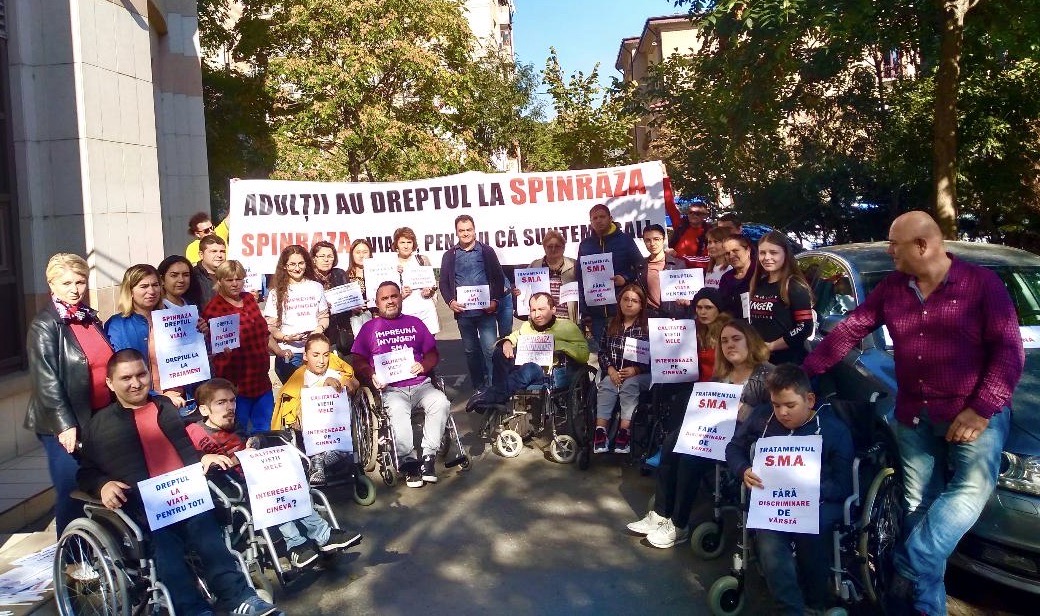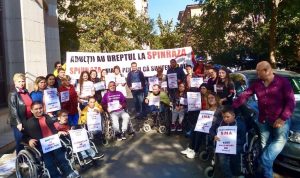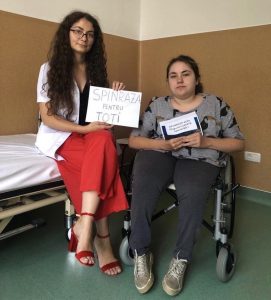Protest Secures Spinraza for All SMA Patients in Romania
Written by |

A recent protest in Bucharest aimed to make Biogen’s Spinraza available to anyone in Romania with SMA. (Photo courtesy of Bogdana Patrascu)
An October 2019 protest by adults with spinal muscular atrophy led to an agreement under which all of Romania’s 152 known SMA patients — and those yet to be diagnosed — will gain access to Spinraza (nusinersen), Biogen’s approved treatment for this neuromuscular disease.
Romanian doctors began treating adults on January 6, the day the agreement took effect. Bogdana Patrascu, a radiologist who led a two-year-campaign to persuade the government to pay for Spinraza for all patients, administered the first dose. She believes all SMA patients will be on Spinraza within six months.
Romania’s National Health Insurance Agency, Biogen, and the Boston-based company’s European partner, Ewopharma, worked out the universal-coverage agreement in December 2019.
Spinraza was approved to treat all forms of SMA in the U.S. in December 2016, and in the European Union in May 2017. But each EU member country must have its national health plan cover the treatment for most people to be able to afford it.
The Oct. 14 protest that the adults organized in front of the National Health Insurance Agency’s Bucharest headquarters built on the success of rallies that parents held in 2018 to obtain Spinraza for their children. The earlier protests resulted in 50 youngsters starting the expensive treatment by May 2019.
Of Romania’s 104 children with SMA, 66 are now receiving Spinraza, said Patrascu, whose 6-year-old daughter, Alberta, has SMA. But the other 38 were not; nor were the country’s 48 adult SMA patients.
This was a key reason adults decided to demonstrate, Patrascu told SMA News Today by email.
“It’s hard to put into words the joy I feel about adults finally getting this therapy,” said Patrascu, who has urged Romanian leaders to approve Spinraza and authorize payments for it since 2017. “We are now very close to all Romanians being treated. It’s a dream come true.”
Patrascu treated the first adult patient at the hospital where she works, the Timisoara Railway Hospital in her hometown. She heads its SMA program.
Spinraza is injected into the spine, and many SMA patients — especially adults — have scoliosis, or badly curved spines. Radiologists often administer the therapy to such patients because their expertise means they are able to find the precise location to inject it.
Romania’s rollout of Spinraza began with one child in October 2018. Doctors added six to eight children a month through May 2019. But progress stalled over how the government would pay for the remaining 100-plus patients. Spinraza carries a U.S. retail price of $750,000 for the first year and $375,000 every year thereafter.
Politics threatened to derail deal
When healthcare officials drew up the original Spinraza treatment priority list, they put adults at the bottom, contending that children should go first because they would benefit the most. Almost a year later, adults are still at the bottom — as is the case in many countries.
Demonstrations were among the strategies that Patrascu used in 2018 to obtain money for Spinraza. Last summer, when adults with SMA asked her what they might do to speed access to treatment, she suggested another demonstration.
Patrascu said the two patients who led the 2019 rally, Catalin Danaila and Ionut Marius Baban, discussed protest strategy with other SMA adults, obtained legal permission for the protest, and crafted a logistics plan. A major challenge was how to get wheelchair-bound patients to and from the National Health Insurance Agency building.
“But it [the protest] shouldn’t be limited to adults, since many children don’t have access to Spinraza, either,” she advised. “We need to stick together on this.”
One reason the Spinraza rollout sputtered after May 2019 was a domestic political crisis that was distracting parliamentarians and government officials, including those in charge of healthcare policies. The crisis triggered a change of government in October 2019 that has eased the turmoil, but not ended it.
At the same time, Romanian officials have been trying to rein in government debt, which at 4% of GDP is twice the limit set by the European Union. Allocating tens of millions of dollars to buy Spinraza for 100 more SMA patients would make balancing the budget even harder, of course.
Under the agreements that Romania and other EU member nations have worked out with Biogen and Ewopharma, Spinraza costs less than the U.S. retail price — details are not disclosed — but it is still hefty.
Access for all
On Oct. 10, 2019, four days before the scheduled Bucharest protest, a no-confidence vote in Parliament ended the Social Democratic Party’s long run as Romania’s governing power — potentially dashing hopes of an agreement that would provide Spinraza to all diagnosed with SMA in the country.
Patrascu joined 45 SMA adults and parents of SMA children in the sign-waving protest, which also drew media attention to their cause.
“There is no doubt in my mind that the protest convinced officials to allocate the necessary funds,” Patrascu said. “They had the opportunity to look into these patients’ eyes and to understand their pain and helplessness, and also to understand that we weren’t going to stop until all SMA patients had access to treatment.”
Then-Health Minister Sorina Pintea showed her support by attending the rally, while Vasile Ciurchea, who headed the National Health Insurance Agency at the time, promised the crowd that steps would be taken before the end of 2019 to get all SMA patients on Spinraza.
The change of government led to Aelda Cojan replacing Ciurchea. Patients were cheered when Cojan ordered her staff to continue working on a Spinraza agreement.
Although negotiations were not made public, Patrascu said reports that Biogen and Ewopharma were making concessions to seal a deal cheered patients.
“I have the utmost respect for the three members of the Biogen team who came to the discussions and for the two Ewopharma representatives — Christian Stanciu, the general manager, and Bogdan Dragulanescu, the medical affairs manager,” she said. “They showed they cared about patients, not just profits.”
Within weeks, those involved in the discussions “were able to find a solution that assured all patients’ access to Spinraza — and that the new Minister of Health, Victor Costache, agreed on,” Patrascu said.
With six of Romania’s seven SMA clinics able to administer Spinraza to adults, Patrascu expects that all patients will be on the therapy by June 2020. This includes Romanians who started taking Spinraza abroad but now want to be treated at home, as well as those newly diagnosed with SMA.





